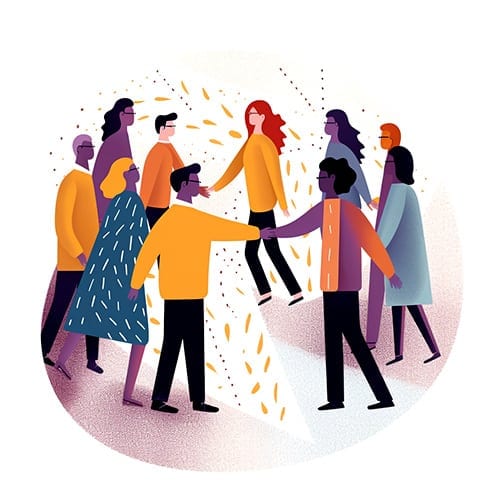Have you ever felt uncomfortable or anxious when someone touched you? Maybe you cringed when a friend hugged you or avoided shaking hands with a stranger. If so, you are not alone. Many people prefer to keep some personal space and limit physical contact with others.

But for some people, the fear of being touched is a debilitating phobia that interferes with their daily life and relationships. This condition is called haphephobia.
Haphephobia is an intense, irrational fear of touching people or being touched by anyone, even family or friends. It can cause severe distress, anxiety, and panic attacks. People with haphephobia may avoid social situations, intimacy, and physical affection. They may also suffer from loneliness, isolation, and low self-esteem.
Haphephobia can have many causes and effects but can also be treated and overcome. In this blog post, we will explore the nature, origins, and impact of haphephobia.
The nature of haphephobia: Understanding the fear of being touched
Haphephobia is a type of anxiety disorder that belongs to specific phobias. These phobias are fears of a specific object or situation that cause excessive, unreasonable, and persistent anxiety. Some common examples of specific phobias are arachnophobia (fear of spiders), acrophobia (fear of heights), and claustrophobia (fear of enclosed spaces).
Haphephobia is not the same as hypersensitivity, which is physical pain associated with touching. Although people with haphephobia do not feel pain when touched, they feel intense fear, panic attacks, and discomfort. They may experience physical symptoms such as sweating, shaking, crying, nausea, fainting, freezing, or running away.
Some people with haphephobia only fear being touched by certain people (such as those of a different gender) or in certain situations (such as crowded places). Others may fear any form of touch at all, even from themselves. Some people may tolerate touching they initiate or consent to, while others may reject any physical contact. Similarly, some people will be more sensitive to touch on certain areas on their body, such as their face, neck, hands, or feet.
Haphephobia can be diagnosed by a mental health professional as a specific phobia using the following criteria from the Diagnostic and Statistical Manual of Mental Disorders (DSM-5). According to the DSM-5, a specific phobia must:
- Create excessive, unreasonable fear disproportionate to the object or situation’s actual threat.
- Cause significant stress or impairment in one’s social, work, or other areas of life.
- Last for at least six months.
- Not be better explained by another mental health disorder.
If you think you have haphephobia or any other specific phobia, you should seek professional help. A qualified therapist or mental health professional can help you understand your condition and provide you with effective treatment options.

Unraveling the origins: How haphephobia develops
There is no single cause for haphephobia or any other specific phobia. Rather, it is usually the result of a complex blend of biological, psychological, and environmental factors. Some possible causes or risk factors for haphephobia are:
- Genetics: Some people may inherit a tendency to develop anxiety disorders or phobias from their parents or other family members. This may be due to genetic variations that affect brain chemistry or nervous system functioning.
- Personality: Some people may have personality traits that make them more prone to developing phobias. For example, people with neuroses, are introverted, or are sensitive may be more likely to experience fear and anxiety in response to certain stimuli.
- Trauma: One of the most common causes of haphephobia is a history of trauma or abuse involving touch. This may include sexual assault, physical abuse, emotional abuse, neglect, or bullying. These negative experiences can create associations between touch, pain, fear, shame, or guilt. They can also damage one’s trust, safety, and self-worth.
- Learning: Another common cause of haphephobia is learning from observation or experience. This may involve witnessing someone else harmed by touch (such as a parent or sibling). These events can create expectations that touch is dangerous or unpleasant. They can also lead to mental health problems, such as post-traumatic stress disorder (PTSD).
- Culture: Some people develop haphephobia due to cultural influences or norms. Different cultures have different rules and expectations regarding touch and personal space. For example, some cultures are more touch-oriented than others; some cultures have strict boundaries between genders, and some cultures have different meanings for different types of touch.
Not everyone with these risk factors will develop haphephobia; likewise, not everyone with haphephobia will have these risk factors. Haphephobia is a complex and individual condition that depends on many factors.
Beyond personal space: Exploring the impact of haphephobia on relationships
Touch is one of the most basic and essential forms of human communication and connection. It conveys love, comfort, affection, support, and happiness. It also provides physical benefits such as reducing stress, lowering blood pressure, boosting immunity, and enhancing well-being.
However, for people with haphephobia, touch can be a source of anxiety, distress, and isolation. People with haphephobia may struggle to form and maintain healthy relationships with others, especially romantic partners, family members, and friends. They may avoid social situations where they fear people might initiate or expect some form of physical interaction, such as parties, dates, or family gatherings. They may also reject or withdraw from touch others offer them, such as handshakes, hugs, or kisses. This can make them feel lonely, misunderstood, and unloved.
People with haphephobia sometimes experience difficulties with intimacy and sexuality. This can include avoiding sexual contact or experiencing extreme distress, disgust, or shame when touched sexually. They may also have trouble expressing their sexual needs and preferences or respecting those of their partners. This can lead to frustration, conflict, and dissatisfaction in romantic relationships.
The impact of haphephobia on relationships can be devastating for the person with the condition and their loved ones. The person with haphephobia may feel guilty, ashamed, or defective for not being able to enjoy touch as others do. They may also feel angry, resentful, or violated when others touch them without their consent or comfort. Their loved ones may feel rejected, hurt, or offended when their attempts to show affection are resisted or avoided. They might also feel confused, worried, or helpless about how to help their partner overcome their fear.
It’s clear that haphephobia hurts one’s mental health but can also harm their well-being and relationships. However, with proper treatment, support, relaxation techniques and communication, people with haphephobia can learn to cope with their fear and enjoy touch in a way that suits them and their partners.
The emotional toll: Navigating the psychological effects of haphephobia
Haphephobia can have serious consequences for one’s mental health and emotional well-being. People with haphephobia often experience negative emotions such as:
Anxiety: People with haphephobia constantly fear being touched or having to touch someone else. They may feel anxious about going out in public places where they might encounter touch stimuli, such as crowds, transportation, or healthcare settings. They may also feel anxious about being touched unexpectedly or without their consent. Their anxiety can include intrusive thoughts or nightmares about touch scenarios that trigger their fear.
Depression: People with haphephobia may feel depressed due to their lack of touch and connection. They may feel hopeless, worthless, or suicidal. They may lose interest or pleasure in activities they used to enjoy, have low self-esteem, and have a negative self-image due to fear. Some might deal with stigma over their condition, which can also cause feelings of depression.
Anger: Someone who suffers from haphephobia might feel angry at themselves or others for their condition. They may blame themselves for being weak, abnormal, or broken. Or, they might blame others for not respecting their boundaries, forcing them to touch, or judging them for their fear. They may have difficulty controlling their emotions and expressing them in healthy ways.
Guilt: People with haphephobia may feel guilty for hurting or disappointing their loved ones with their fear. They may feel like they are letting them down, pushing them away, or depriving them of affection. They may also feel guilty for not overcoming their fear and enjoying touch.
Loneliness: Loneliness and isolation are also common with haphephobia. People struggling with this phobia tend to have fewer social contacts and opportunities than others. They may also feel misunderstood and unsupported by those who do not share or respect their fear. While they may crave touch and intimacy, they cannot attain it.
Haphephobia can affect one’s mood, cognition, behavior, and motivation while increasing the risk of developing another mental health condition, such as an anxiety disorder, depression, or substance abuse problem.
However, haphephobia does not have to define one’s identity, personality type, or destiny. With proper treatment, such as exposure therapy, people with haphephobia can learn to cope with and manage their fear and improve their mental health.
Conclusion
Haphephobia, the fear of being touched, can profoundly impact people’s lives. It can lead to problems such as panic attacks, anxiety disorders, and difficulty in various life aspects. It can also lead to significant distress.
However, there is hope for overcoming this fear. Through therapy, support from loved ones, relaxation techniques, and a commitment to self-care, individuals with haphephobia can triumph over their fear, reclaim their comfort in physical contact, and embrace the healing power of touch.
Together, let us raise awareness, share feedback, promote acceptance, and empower those with haphephobia to embark on a journey of healing and connection.
- Escalaphobia: Conquering Moving Mountains, One Step at a Time - December 19, 2024
- How Psychologists Can Empower Communities - March 25, 2024
- The Potential of Medical Cannabis for Neurological Conditions - February 26, 2024

